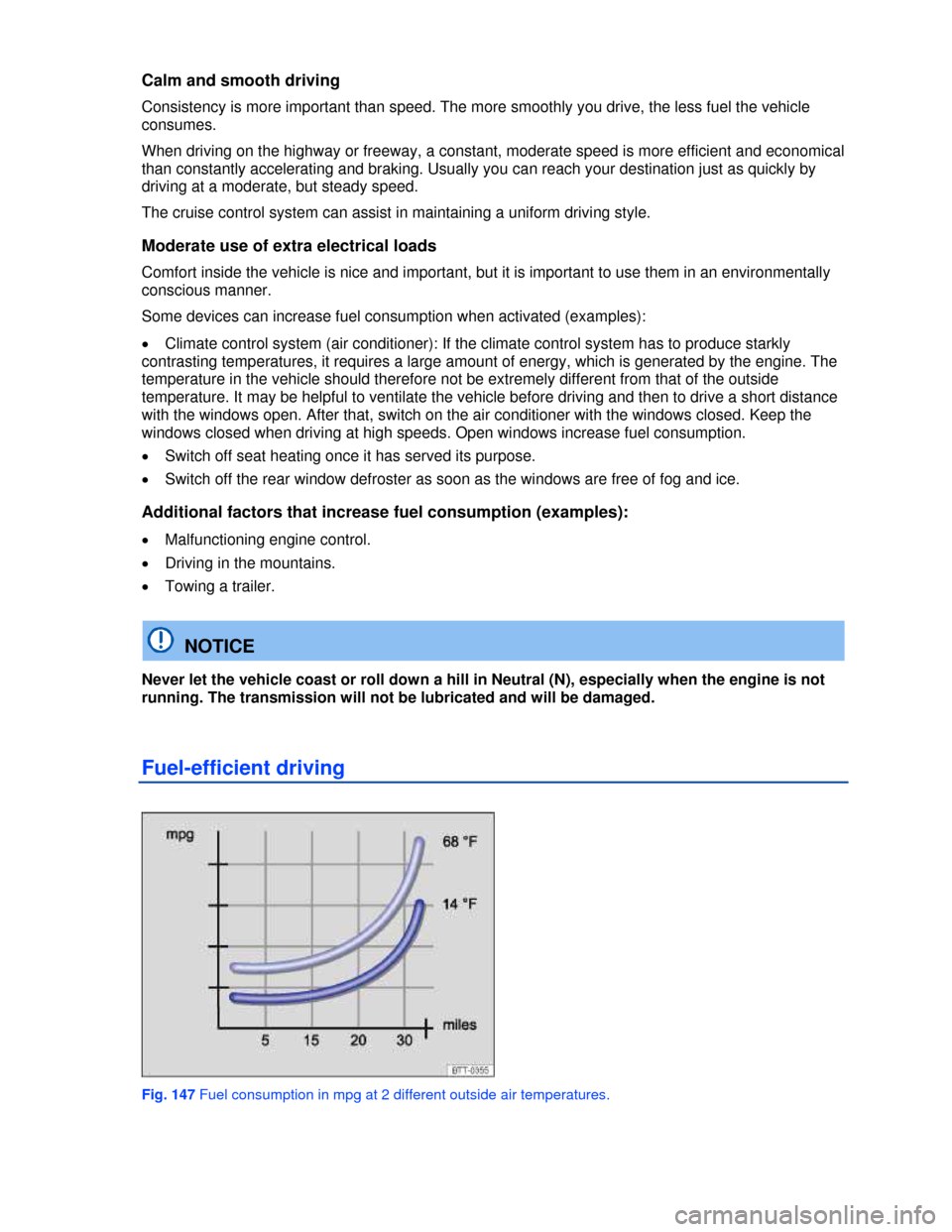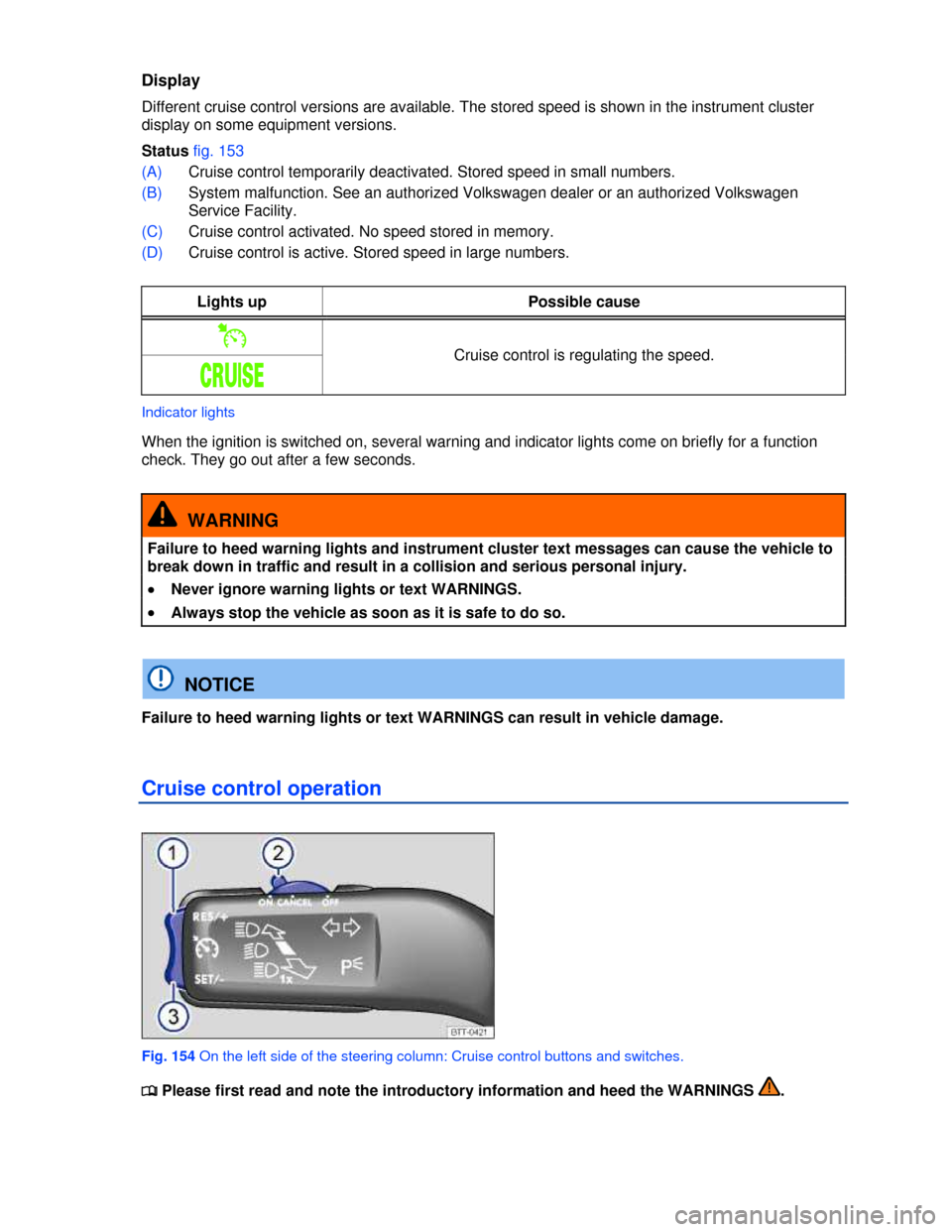Page 218 of 379

Calm and smooth driving
Consistency is more important than speed. The more smoothly you drive, the less fuel the vehicle
consumes.
When driving on the highway or freeway, a constant, moderate speed is more efficient and economical
than constantly accelerating and braking. Usually you can reach your destination just as quickly by
driving at a moderate, but steady speed.
The cruise control system can assist in maintaining a uniform driving style.
Moderate use of extra electrical loads
Comfort inside the vehicle is nice and important, but it is important to use them in an environmentally
conscious manner.
Some devices can increase fuel consumption when activated (examples):
�x Climate control system (air conditioner): If the climate control system has to produce starkly
contrasting temperatures, it requires a large amount of energy, which is generated by the engine. The
temperature in the vehicle should therefore not be extremely different from that of the outside
temperature. It may be helpful to ventilate the vehicle before driving and then to drive a short distance
with the windows open. After that, switch on the air conditioner with the windows closed. Keep the
windows closed when driving at high speeds. Open windows increase fuel consumption.
�x Switch off seat heating once it has served its purpose.
�x Switch off the rear window defroster as soon as the windows are free of fog and ice.
Additional factors that increase fuel consumption (examples):
�x Malfunctioning engine control.
�x Driving in the mountains.
�x Towing a trailer.
NOTICE
Never let the vehicle coast or roll down a hill in Neutral (N), especially when the engine is not
running. The transmission will not be lubricated and will be damaged.
Fuel-efficient driving
Fig. 147 Fuel consumption in mpg at 2 different outside air temperatures.
Page 230 of 379
Cruise Control System (CCS)
�
Page 232 of 379

Display
Different cruise control versions are available. The stored speed is shown in the instrument cluster
display on some equipment versions.
Status fig. 153
(A) Cruise control temporarily deactivated. Stored speed in small numbers.
(B) System malfunction. See an authorized Volkswagen dealer or an authorized Volkswagen
Service Facility.
(C) Cruise control activated. No speed stored in memory.
(D) Cruise control is active. Stored speed in large numbers.
Lights up Possible cause
�% Cruise control is regulating the speed.
�#�2�5�)�3�%
Indicator lights
When the ignition is switched on, several warning and indicator lights come on briefly for a function
check. They go out after a few seconds.
WARNING
Failure to heed warning lights and instrument cluster text messages can cause the vehicle to
break down in traffic and result in a collision and serious personal injury.
�x Never ignore warning lights or text WARNINGS.
�x Always stop the vehicle as soon as it is safe to do so.
NOTICE
Failure to heed warning lights or text WARNINGS can result in vehicle damage.
Cruise control operation
Fig. 154 On the left side of the steering column: Cruise control buttons and switches.
�
Page 233 of 379
In order to: You must: ⇒fig.154Result:
Switch on cruise control. Move switch (2) to �/�. position. System is switched on, but does not
regulate vehicle speed until a speed
is set.
Set cruise control to
current vehicle speed.
Press button (3) �3�%�4�
Page 378 of 379

Abbreviations
Abbreviation Meaning
5S manual 5-speed manual transmission
6S automatic 6-speed automatic transmission
6S manual 6-speed manual transmission
ABS Anti-lock Brake System
AFS Adaptive Front Lighting System
AKI Anti-Knock Index
ANSI American National Standards Institute
ASR Anti-Slip Regulation
ATA Anti-Theft Alarm system
BAS Brake Assist System
ccm Cubic centimeters - unit of measure for engine displacement
CCS Cruise Control System
CID Cubic inches - unit of measure for engine displacement
cm Centimeter - metric unit of measure for length
CO2 Carbon dioxide
DIN Deutsches Institut für Normung (German Institute for Standardization)
DPF Diesel Particulate Filter
DRL Daytime running lights
DSG® DSG® Direct Shift Gearbox automatic transmission
EDL Electronic Differential Lock
EN European Norm
EPC Engine control (Electronic Power Control)
ESC Electronic Stability Control
FSI Fuel Stratified Injection
g/km Generated carbon monoxide amount in grams per kilometer driven
GAWR Gross Axle Weight Rating
GVWR Gross Vehicle Weight Rating
HID High Intensity Discharge headlights (Xenon)
hp Horsepower - unit to measure engine power
kg Kilogram - metric unit for weight
kN Kilonewton - a measure of force
kp Kilopond - a measure of force
kPa Kilopascal - unit of measure for tire pressure
kW Kilowatt - engine rating